


1 | TAXIPOINT | AUGUST 2023 | EDITION 52 WWW.TAXI-POINT.CO.UK AND CABBIES’ QUESTION, FUEL REPORT, NEW TYRE CENTRE, TAXI BUSINESS NEWS PLUS MORE! OVER 4.6 MILLION MAGAZINE READS AND COUNTING... INFLATION PAYMENT DEVICES INDUSTRY CHANGING 2023 TAXI STATS CANCELLED TAXI BOOKINGS TOM HUTLEY: WHY I DON’T USE SAT NAV VAT APPLIED THE RULING: ZERO-RATED HACKNEY AFFECT HMRC EXAMINING RULING
TaxiPoint Chief Editor:
Perry Richardson
TaxiPoint Publishing & Advertising Manager:
Lindsey Richardson
Visit us online at: www.taxi-point.co.uk


Write to us at: contact@taxi-point.co.uk

Advertising enquiries at: advertising@taxi-point.co.uk
The publishers reserve the right to refuse, withdraw, amend or otherwise deal with all advertisements without explanation. All advertisers must comply with the British Code of Advertising practice.
The views expressed in this publication are not necessarily those of the publishers.
All written and image rights are reserved by the author as displayed. Reproduction in whole or in part without prior permission from the publisher is strictly prohibited.

Copyright brand TaxiPoint 2023. Creative Common image licenses displayed where applicable.
FROM THE EDITOR
RICHARDSON
BIG CHANGES AHEAD
Hello and welcome to the August 2023 edition of TaxiPoint.
England’s taxi and private hire vehicle (PHV) industry had waited what seemed an age for the Uber versus Sefton ruling to emerge. Now that it has arrived, the result pushes operators in line with those operating in London when it comes to ‘principality’ of a booking…
The ruling will force changes to business models that have been put in place for decades. PHV operators will likely be forced to pay the VAT invoices, not the driver, for each booking made through their platform.
Despite the result, there still remains uncertainty for many.
How much will passenger fares rise by? How much tax will HMRC order the industry to pay? Will this spark more court cases? How will drivers’ working rights change? If ‘zero-rated’ VAT was granted, how would that affect the hackney carriage industry?

Ten’s of thousands of readers turned to TaxiPoint for comprehensive news on the ruling (for which we are very grateful), and in this edition we continue to report on and explore the implications.
Kind regards and be lucky!
 TaxiPoint Editor and Founder
TaxiPoint Editor and Founder
2 | TAXIPOINT | AUGUST 2023 | EDITION 52
PERRY

2023 STATS
The number of licensed taxi and private hire vehicle (PHV) drivers in England has seen a modest increase, with a notable rise in licences attributed to Private Hire Vehicles (PHVs) over the past year, according to recent data released by the licensing authorities.

As of 2023, there were a total of 346,300 driver licences in England, reflecting a significant increase of 16,300 (4.9%) compared to the previous year. Among these licences, 67% were exclusively for PHVs,
11% were solely for taxis, and 21% were dual licences, permitting drivers to operate both taxis and PHVs.
Interestingly, the regional analysis revealed distinct variations in the changes observed between 2022 and 2023. The West Midlands emerged as the region with the highest increase, experiencing a notable surge of 28.0%. This substantial rise can predominantly be attributed to a significant increase in licensed drivers in Wolverhampton.
WORRYING TREND FOR WHEELCHAIR ACCESSIBILITY, BUT ELECTRIC SHIFT GATHERS PACE
‘AS OF 2023, THERE WERE A TOTAL OF 346,300 DRIVER LICENCES IN ENGLAND, REFLECTING A SIGNIFICANT INCREASE OF 16,300 (4.9%) COMPARED TO THE PREVIOUS YEAR.’

In contrast, most other regions demonstrated more moderate fluctuations, with increases or decreases of less than 5% in licensed driver numbers. These variations could be attributed to local factors, such as changes in demand for transportation services and shifts in regional policies.
WHEELCHAIR CONCERNS
Less than 1% of all Private Hire Vehicles (PHVs) in London are wheelchair accessible vehicles (WAVs). The low figure has once again raised concerns over future accessibility and inclusivity in the capital as the number of licensed hackney carriage WAV drivers shrinks.

The DfT's statistics showed that in 2023, out of all the licensed vehicles in England, only 13% were wheelchair accessible. This percentage includes both taxis and PHVs. Taxis performed much better in terms of accessibility, with 55% of them being wheelchair accessible. However, the figure for England’s PHVs remained worryingly low at just 2%. These proportions closely mirror the statistics from the previous year, indicating little progress has been made in improving accessibility within the PHV sector.
In London, less than 1% of PHVs were wheelchair accessible, while in the rest of England, this figure slightly increased to 3%. Generally, larger metropolitan areas tended to have a higher proportion of wheelchair accessible taxis, but lower proportions of wheelchair accessible PHVs, exacerbating the transportation inequality faced by disabled individuals.
In London, all 15,100 taxis were found to be wheelchair accessible, in compliance with Transport for London's 'Conditions for Fitness' taxi licensing policy. On a similar positive note, several other large cities such as Birmingham and Manchester exhibited similar inclusivity, with all licensed taxis being wheelchair accessible. 39% of taxis outside of London are registered as being wheelchair accessible.
As PHV numbers continue to boom and taxi numbers decrease, the statistics highlight a pressing need for action to address the lack of wheelchair accessible PHVs in England. For disabled individuals reliant on door-to-door transport, this continued disparity could limit their long-term independence and restrict mobility options.
MOVE TO ELECTRIC
As of 31 March 2023, petrol and diesel vehicles remained the dominant fuel type, accounting for 77% of the taxi fleet and 53% of the PHV fleet. However, hybrid vehicles represented 22% of taxis and 40% of PHVs, while battery electric vehicles made up 0.8% and 6.4% of the respective fleets.
A comparison with the period between 2020 and 2023 shows a positive trend towards cleaner fuel alternatives. The proportion of taxis using petrol and diesel has decreased from 89% in 2020 to 77% in 2023. In contrast, hybrid vehicles have witnessed a doubling in usage, rising from 10% to 22% during the same period. Similarly, battery electric vehicles have experienced a significant four-fold increase, growing from 0.2% in 2020 to 0.8% in 2023.
‘AS PHV NUMBERS CONTINUE TO BOOM AND TAXI NUMBERS DECREASE, THE STATISTICS HIGHLIGHT A PRESSING NEED FOR ACTION TO ADDRESS THE LACK OF WHEELCHAIR ACCESSIBLE PHVS IN ENGLAND.’
Analysing the PHV fleet, the figures indicate a similar but slightly different pattern. The proportion of PHVs using petrol and diesel decreased from 65% in 2020 to 53% in 2023. Hybrid vehicles have seen a slight increase from 34% in 2020 to 40% in 2023. The most significant growth has been observed in battery electric vehicles, which have multiplied eight-fold, surging from 0.8% in 2020 to 6.4% in 2023.
Compared to the overall car fleet in England, taxis and PHVs exhibit distinct fuel usage patterns. As of December 2022, 93% of licensed cars were petrol and diesel, 5.3% were hybrid, and 2.0% were battery electric vehicles. This indicates that both the taxi and PHV fleets have a higher proportion of hybrid vehicles (22% for taxis and 40% for PHVs) while having a lower proportion of battery electric vehicles (0.8% for taxis and 6.4% for PHVs) compared to the overall car fleet.
Furthermore, petrol cars were significantly less common in the taxi fleet (2.7% of all vehicles) and the PHV fleet (5.9% of all vehicles) than in the overall car fleet (59% of all vehicles). Conversely, diesel vehicles were more prevalent in the taxi and PHV fleets than in the overall car fleet.

The data suggests that diesel and hybrid electric vehicles are more popular within the taxi and PHV sectors compared to the car fleet as a whole, while petrol vehicles are less prevalent. Moreover, a higher proportion of taxis (14%) and PHVs (6%) are electric or range-extended electric vehicles compared to the overall car fleet (2.1%).

LANDSCAPE CHANGED TAXI&PHV

THERESULT
UBER BRITANNIA LIMITED
V
SEFTON METROPOLITAN BOROUGH COUNCIL & ORS
Uber and App Drivers & Couriers Union (ADCU) successfully defeated Sefton Council and a handful of regional operators in a landmark ruling that will change the landscape of the private hire vehicle (PHV) sector.

Sefton Council, who took a neutral stance throughout the court case, and regional minicab operators sought to challenge a declaration that the contract for minicab transport should be between operators and the passenger and not between drivers and passengers.
In 2021, the ADCU defeated Uber in a similar action in the High Court under separate legislation covering only London. As a result, Uber has been forced to change its business model contract directly with passengers rather than misclassifying itself as an agent. This has helped confirm driver status as workers with statutory protections. And since Uber becomes the principal rather than the agent, it is now liable for VAT.
By incorrectly designating their drivers as principal for the last decade, no VAT has been paid on Uber services since drivers do not earn enough to meet the VAT threshold of £85,000. This changed on 31 October 2022 when Uber announced that it had reached a settlement with HMRC for back VAT payment of £615 million in unpaid tax.
In order to level the competitive playing field nationally, Uber sought a declaration at the High Court to the one imposed on it for London to cover the rest of England and Wales. This was opposed by
transport of their passengers and pay taxes due.

9 | TAXIPOINT | AUGUST 2023 | EDITION 52 WWW.TAXI-POINT.CO.UK
the Veezu Group, Delta Merseyside and a coalition of operators they claim to represent.
IMAGE CREDIT:
FREENOW
THERULING
In her ruling, Mrs Justice Foster DBE provided the following legal analysis on the case officially listed as Uber Britannia Limited v Sefton Metropolitan Borough Council & ORS:
ON WORKER RIGHTS:
There is considerable strength in the view that a properly regulated and remunerated pool of drivers is a benefit to public safety.
It is clear also from The Maxwell Stamp Report that the agency driver model was deprecated by the Committee. ADCU advanced a series of compelling arguments to the effect that drivers’ working conditions may well improve as a result since they would at least in some circumstances, be recognised as workers with working time, sick pay and minimum wage rights.
ADCU did not accept that since the old style agency model was the backdrop to the 1976 Act, it determined its interpretation: they point to the fact that Maxwell Stuart suggested reform. I agree.
ON PUBLIC SAFETY:
I am not persuaded that the issue of public safety is a weak purpose and of little use for the construing of the 1976 Act. Veezu and Delta suggested the licensing mechanism and the requirement for insurance were adequate protections, and there was no drive to construe the provisions as UBL argued.
Such measures in my view are, as noted by ADCU, ex post facto remedies and are no substitute: one may not insure against criminal acts.
Furthermore such provision does nothing to raise standards; it is not precautionary. Thus, without such a direct responsibility placed upon operators, there is less likelihood that drivers will be trained or their performance managed: it

conduces to better standards and public safety which serves the purpose of the 1976, as the 1998 Act. These were the submissions of ADCU; I agree.
ON UBER'S BID TO RESTRICT THE DECLARATION:
There is no reason on the wording to limit this to the first sub-contractual situation only, as suggested by UBL: the contract of hire should always be with the operator who has interacted with the hirer/ passenger, since he can control the booking, the driver under the Act is, as submitted by ADCU, subordinate to the operator, working (unlike the hackney cab who plies for hire), entirely through the operator.
ON REJECTION OF SEFTON, VEEZU AND DELTA'S ARGUMENT THAT VAT AND WORKER RIGHTS LIABILITY WOULD DAMAGE THE TRADE:
The VAT consequences for those who will wish to change their operating model are in my judgement irrelevant.
They do not condition the reading of the provisions, it could never be said that a change in the taxation position is an absurd consequence the draughtsman could never have contemplated would result and did not intend.
It, together with certain postulated economic consequences do not have relevance to the exercise of statutory construction before the Court.
Nor indeed, as was canvassed in argument, is it wholly impossible that any consequent change by way of increase to fares because of an element of taxation would necessarily be passed on to the customer.
10 | TAXIPOINT | AUGUST 2023 | EDITION 52 WWW.TAXI-POINT.CO.UK
IMAGE CREDIT: FREENOW

IMPLICATIONS OF LANDMARK RULING ON VAT FOR PRIVATE HIRE VEHICLE OPERATORS
HM Revenue and Customs (HMRC) are currently assessing the potential impact of a landmark ruling on the Value Added Tax (VAT) obligations of private hire vehicle (PHV) operators. The ruling was handed down by the High Court in the case of Uber Britannia Limited v Sefton Metropolitan Borough Council, addressing legislation relating to PHVs in England, excluding London and Plymouth.

The ruling emerged from a legal dispute involving Sefton Council and local minicab operators who sought to preserve the existing arrangement, wherein the contract for minicab transportation was considered to be between the driver and passengers rather than between the operator and passengers. However, Uber and the App Drivers & Couriers Union (ADCU) successfully challenged their opponents, resulting in a significant transformation of the private hire vehicle (PHV) sector.
The ruling was not a tax case and does not have a direct bearing on tax positions. Existing VAT rules around principality, which are applicable to all businesses, continue with no changes. The Government routinely monitors and reviews all tax matters.
Local licensing authorities like Sheffield City Council (SCC) are currently ‘working to establish the full extent’ of the ruling on private hire operators. Following the landmark decision, the council
intends to determine how this ruling ‘impacts’ licensed private hire operators.
SCC Councillor Joe Otten, Chair of the Waste And Street Scene Committee, said: “Sheffield City Council is aware of the recent High Court ruling in the case of Uber Britannia Limited v Sefton Borough Council, relating to private hire operators. The council is working to establish the full extent of the ruling and determine how this impacts private hire operators that are licensed by Sheffield City Council.”
In a similar ruling in London back in 2022, Transport for London (TfL) warned all Private Hire (PH) Operators to take ‘IMMEDIATE ACTION’ to make changes to their terms and conditions and ensure compliance to updated regulations.
A new condition was inserted into the Private Hire Vehicles (London) Act 1998 stating:
‘(14) The operator shall enter into a contractual obligation as principal with the person making the private hire booking to provide the journey which is the subject of the booking and any such contractual obligation must be consistent with the 1998 Act and these Regulations.’
Similar changes to local licensing conditions are now expected outside of London following the recent judgment, which in turn would confirm principle booking positions to tax authorities.
12 | TAXIPOINT | AUGUST 2023 | EDITION 52 WWW.TAXI-POINT.CO.UK HMRC EXAMINING

VAT APPLIED
WILL PHV PRICES RISE BY 20% AND WHY WILL TAXI PRICES STAY THE SAME?
Uber and App Drivers & Couriers Union (ADCU) successfully defeated Sefton Council and a handful of regional operators in a landmark ruling that will undoubtedly change the landscape of the private hire vehicle (PHV) sector.

The crux of the issue centred around who was the principal contract holder with the customer. The operator or the driver.
The court ruled, just like in London, that the operator holds the principle in a booking made. For decades the driver footed the risk of VAT payment should they ease past their individual VAT threshold.
Moving to a merchant model will require operators to change their business processes and contractual arrangements, and as a result, impacts the way that VAT is charged.
Some reports are claiming that all taxi fares will need to rise because of this. Despite pictures of the iconic black cab circulating next to these misleading headlines, hackney carriage drivers will not be affected.
VAT cannot be applied to a metered fare and taxi drivers turning over less than £85,000 will not be liable to pay VAT.
Crucially all private hire vehicle operators WILL need to pay VAT. But it might not necessarily mean a 20% hike in their fares either.

14 | TAXIPOINT | AUGUST 2023 | EDITION 52 WWW.TAXI-POINT.CO.UK
There are big questions raised by the ruling asking which is an appropriate VAT regime for the private hire industry. Some private hire operators are already arguing that they qualify to apply VAT on their margin from each trip rather than on the full fare.

If VAT is only required on the margin of payment kept by the operator, the rise in prices could be between 6-8% dependent on the percentage the operators take from each fare.
According to Uber, they would claim they have been following HMRC’s own guidance (VAT Order 1987) to apply VAT on the margin of a trip. Other operators including Bolt and FREENOW have been doing the same, as stated on their invoices. While the ruling provides clarity on the principality of the booking, there remains several big questions unanswered. HMRC will need to decide whether the operators need to pay the full 20% or the marginal in the coming months.

6-8 PERCENT RISE EXPECTED?

15 | TAXIPOINT | AUGUST 2023 | EDITION 52 WWW.TAXI-POINT.CO.UK
RATED
There are several VAT permutations being bandied about since the ‘Uber versus Sefton’ court ruling was announced, but we’re going to look at one example that exists in other countries like Ireland and Denmark: zero-rated VAT.
We caught up with Jason Short, Director of taxi accounting specialists Short and Sons Accountants Ltd, and asked how zero-rated VAT would affect hackney carriage drivers should it come in.
Short said: “Currently, Self Employed need to register for VAT at £85,000 turnover, which poses a massive problem for London Taxi Drivers since TFL sets the maximum fares. A VAT-registered driver would have a £10 metered fare slashed by £1.66 because of this. In the latest 2023 year SAS has seen drivers heading over £80,000 for the first time, with some coming extremely close to the VAT threshold. While VAT registration would allow the driver to claim the VAT back on costs, it would make a noticeable dent in the endof-year profit figures.
“Taxi operators on the other hand distinguish themselves as an 'Agent' to get around this VAT problem. This means the Fare they receive is passed through their account as the driver's money (like Gett payouts for example), and only the commission the operator receives is liable as their income and only that part is liable for VAT.
WHAT WOULD A ZERO-RATED TAXI INDUSTRY LOOK LIKE FOR HACKNEY CARRIAGE DRIVERS?
This means they can have a much higher turnover before registration for VAT.”
“If VAT for the Taxi industry were slashed to zero per cent, it would be a massive win for taxi drivers because it would allow them to reclaim VAT on such items as fuel. Butchers who are zero rated, register as soon as they start trading to claim VAT back on costs, and drive up profits. If a zero per cent rating was given to taxi drivers it would undoubtedly cause a massive rush to be VAT registered. It would mean drivers could claim the VAT back on a shiny new TXE too. We think this would be an extremely generous gift from the Government on top of the £7,500 grant that they have been running too and this is unlikely to happen.
“A more likely option is for the taxi industry to be given an exemption from VAT. This differs from zero per cent VAT as businesses that are exempt are not able to claim VAT on the cost of their purchases. Essentially this means that the income and expenses would remain as they are now, with no VAT being paid to HMRC on sales or being reclaimed on purchase no matter if the turnover went over £85k.
“Both Limited Companies and Self Employed can be registered for VAT, so there is no escaping the VAT net!”

16 | TAXIPOINT | AUGUST 2023 | EDITION 52 WWW.TAXI-POINT.CO.UK 0%

CANCELLED
TAXI BOOKING CIRCLE OF REJECTION CONTINUES TO LEAVE RIDERS, DRIVERS AND VENUES FRUSTRATED
The use of taxi booking apps and platforms has become increasingly popular in recent years, but a vicious circle of rejection between riders, drivers, and venues has continued to cause problems for all three groups.

Just after covid restrictions were dropped, TaxiPoint reported that riders were becoming increasingly frustrated by the long wait times for taxis and the cancellation of bookings originally accepted by the driver. However, the cancellation made by the driver was sometimes prompted by the uncertainty of cancellations made by the venue or customers.

Why are customers and venues cancelling on drivers who are enroute? There are two main reasons. One, a different taxi arrives first, dropping a passenger off, and the
waiting passenger just jumps into the now available cab without cancelling their original booking. Cancelling or failing to turn up for the original booked cab has no penalties or charges so why would they wait?
The second reason is that some hotel concierge workers are booking multiple taxis for the one single booking to ensure a car turns up. So long as their resident gets a ride, they get their tip, everyone is happy from their point of view. For the other multiple
WHAT IS THE SOLUTION?
18 | TAXIPOINT | AUGUST 2023 | EDITION 52 WWW.TAXI-POINT.CO.UK
IMAGE CREDIT: FREENOW
cabs that turn up there’s nothing but wasted time and fuel costs to welcome them.
Something must give as, in theory, the system should work for all three groups.
Drivers are now at a stage of being very wary of accepting longer requests with longer run-ins and have noted the hotels that play the system. That’s not good for the passenger who will feel let down by the black cab service, when in fact it’s down to months of concierge cancellations.
There are a number of solutions that have been proposed to break the circle of rejection, including:
• Displaying the number of cancelled jobs in the last 100 requests. This would allow venues and drivers to see each other's cancellation rates and make more informed decisions about whether to accept a job.
• Providing better communication between riders and drivers. This could be done through the taxi app itself, or through a separate messaging platform.

• Offering incentives, or penalties, for riders and drivers to behave in a more cooperative way. For example, venues could be rewarded for not cancelling their rides, and drivers could be rewarded for accepting longer pick-up times.

• Working with venues to ensure that they are not abusing the system by booking multiple taxis for one rider. Threaten the removal of the booking system if they cannot use it responsibly.
Who is going to make the first move to help this taxi eco-system function better? The driver, the venue or the passenger?
19 | TAXIPOINT | AUGUST 2023 | EDITION 52 WWW.TAXI-POINT.CO.UK
TOM HUTLEY: WHY I DON’T USE A SAT NAV

Tom Hutley is not your average taxi driver. He is also a popular YouTuber who shares his insights and experiences of driving a black cab in London. In one of his recent videos, he reveals why he doesn't use a sat nav to navigate the streets of the capital.
Tom, like all other qualified black cab drivers in London, had to pass the in-depth road test called the Knowledge of London (KoL). The KoL is a rigorous examination that requires cabbies to memorise thousands of streets, landmarks, routes and restrictions within a six-mile radius of Charing Cross. It can take years of study and practice to master the KoL, but it gives cabbies an edge over other drivers.
In the video, Tom compares the route a cabbie would take from a point in the City of London to London Bridge Hospital. He shows how using

Google Maps would suggest a longer and more congested route. Thanks to the KoL, Tom knows that he can take a shorter and faster route that goes over London Bridge, which is only accessible to publicly hailed taxis and buses.
Tom also explains how using a sat nav would be impractical for cabbies due to the time it would take to input the destination after being hailed by a passenger. He adds that cabbies have a dense local knowledge of multiple drop-off points at destinations like railway stations and hotels, which a sat nav might not provide.
Tom's channel has received 100,000’s of views from people who appreciate his commentary and knowledge of the industry.
20 | TAXIPOINT | AUGUST 2023 | EDITION 52 WWW.TAXI-POINT.CO.UK
QUESTION
Driving a taxi is flexible work where cabbies can choose not only the hours they work, but also how much they want to earn.
But how do cabbies work a shift behind the wheel? Do they set monetary daily targets or do they set a daily time limit?
The pros of setting a daily target mean you’re more than likely to earn what you need. There is however likely to be more anxiety and stress during the day when demand is slower and it takes longer to earn the target required. It’s also mentally very easy to call an end to your shift as soon as the shift is over, even though there is more earning potential when demand is high.

Taking less notice of what’s arriving on your money trays throughout the day is less stressful, but it remains key that you make a note of each fare to tally up at the end of the day. Experienced cabbies can set the number of hours that usually generates the money required over the course of a week or month. The idea is that daily income will fluctuate, but the good and the bad days will even themselves out.
London taxi driver, Robert Oakley, said: Always done the hours. Otherwise, you’re going to be chasing a target.”
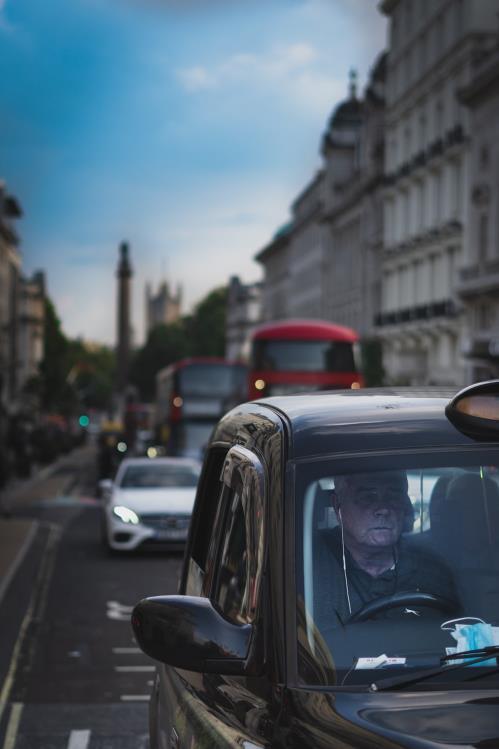

John Cunningham had a slightly different, and perhaps better, take on both options, saying:
“There's a point in the day when my brain says that will do…”
Overall, there was a really mixed approach to how drivers set out to earn what’s required. Would you expect anything else from the UK taxi industry though?!
21 | TAXIPOINT | AUGUST 2023 | EDITION 52 WWW.TAXI-POINT.CO.UK
IMAGE CREDIT: X (FORMERLY KNOWN AS A TWITTER)
POP UP TAXI TYRE OPERATIONS IN PARTNERSHIP WITH EV SERVICE HUB

benefits of its EV tyres during real world trials, extending the range of the fleets vehicles by improving energy efficiency and increasing safety by improving wet
ENSO are now operating up alongside EV Service Hub in Tottenham, Mowlem Trading Estate, Leeside Road, London N17 0QJ, and is proud of its association with Colts. Drivers can book-in via s dedicated www.enso.london – and reserve their one-hour fitting slot including free wheel alignment for just

22 | TAXIPOINT | AUGUST 2023 | EDITION 52 WWW.TAXI-POINT.CO.UK
IMAGE CREDIT: ENSO
IMAGE CREDIT: ENSO
£299 including VAT.
Samuel Judah, Managing Director
of EV Service

Hub, said: “We wanted to create a service centre from the ground up that was designed to support the demanding requirements of EV commercial vehicles from cabs to vans, ‘if the wheels aren’t turning, then drivers aren’t earning’. Adding Enso tyres to our stable of services was just common sense to give drivers and fleets exemplary service and sustainability.”
Over the last month, ENSO has begun to fit their tyres onto one of London’s largest electric cab fleets. Michael Glassman, Owner of Colts Cabs, said: “We are proud to be leading the charge in the Black Cab trade to not only reduce pollution but also to give drivers more miles per charge, this is consistent with our aim of making sure the cab trade is world class in every way, from service to sustainability.”

ENSO sees this as a crucial partnership with the taxi trade and hopes partnerships will be mutually beneficial.

ENSO wants taxi drivers to provide the company with feedback to help them in their quest to “constantly innovate” and improve their product.
Governments and regulators are concerned about urban air pollution and are now looking at tyre particulates as a major source of this; having a zero-emission capable vehicle will no longer be enough. For example, a new EURO 7 emission standard for vehicle manufacturers will be introduced from July 2025, including a minimum standard for tyre PM emissions for the first time. ENSO’s tyres use less energy per mile, reduce particulate emissions and make the TX even cleaner. Find out more at www.enso.london and book your appointment at EV Service Hub to get more miles for your money.
23 | TAXIPOINT | AUGUST 2023 | EDITION 52 WWW.TAXI-POINT.CO.UK
IMAGE CREDIT: ENSO
“We wanted to create a service centre from the ground up that was designed to support the demanding requirements of EV commercial vehicles from cabs to vans, ‘if the wheels aren’t
SAMUEL JUDAH
turning, then drivers aren’t earning’.”
IMAGE CREDIT: ENSO
BOLTON CABBIES VICTORIOUS AFTER MLS 2 SCHEME SCRAPPED
ARTICLE BY:
In a significant turn of events, the leadership of Bolton Council has withdrawn its support for the controversial "Minimum Licensing Standards 2" (MLS 2). This policy, which would have imposed charges on drivers operating vehicles older than ten years, has been a subject of intense debate and opposition from drivers across the borough. They argued that the policy could potentially devastate their livelihoods.
The council's decision marks a significant shift in policy. Council leader Cllr Nick Peel stated: "We have decided that we are not going to continue pursuing MLS 2." He emphasized that the decision was entirely that of the Labour council, pointing out that the previous Conservative council had years to address this issue but failed to do so.
The MLS scheme was a collective agreement by Greater Manchester's ten councils in 2018. It aimed to establish common standards for the 11,500 private hire vehicles across

the city region. Bolton Council, under its previous administration, had agreed to the first stage of the MLS proposals, which were approved in September 2021. However, the scheme has been met with staunch opposition from drivers in Bolton.

They expressed concerns that the policy, which required taxi/private hire vehicles to be no more than five years old upon first registration and less than ten years on the road to avoid a charge, could potentially force them off the road. They also raised concerns that a common livery policy might make them more susceptible to vandalism.

In response to these concerns, Bolton Council's leadership announced changes to the policy in June. These included removing the age policy, ensuring no Greater Manchester and pushing back the new emissions policy from 2028 to 2030.
Despite these changes, the Bolton Private Hire Association continued to vehemently oppose the scheme.
24 | TAXIPOINT | AUGUST 2023 | EDITION 52 WWW.TAXI-POINT.CO.UK
They demanded that it be scrapped entirely, arguing that neither the Labour nor Conservative administrations had been listening to them.
Following meetings between representatives of the taxi trade and council leadership, including Cllr Peel, deputy leader Cllr Akhtar Zaman, and cabinet member for regulatory services and property Cllr Sue Haworth, the council leadership has now withdrawn support for MLS 2. The expectation is that the status quo will be maintained.

Bolton Private Hire Association Secretary Yasif Khan expressed his satisfaction with the decision, thanking the administration for recognizing the financial burden the policy would have placed on drivers. He stated: "From day one we were telling them it wasn't affordable for the drivers, it would have been very difficult to get finance on new cars and it
would have been very difficult with the secondhand market as well."
He added: "If it's not broken, don't fix it, as we've always said we already do two MoTs. There has never been any issue with safety and the safety of our passengers is always paramount."

This decision marks a significant victory for Bolton's taxi and private hire drivers, demonstrating the power of collective action and negotiation in shaping policy decisions.
ARTICLE BY:

25 | TAXIPOINT | AUGUST 2023 | EDITION 52 WWW.TAXI-POINT.CO.UK
SUPERMARKET MARGINS ON PETROL AND DIESEL MORE THAN DOUBLED SINCE RUSSIA INVADED UKRAINE REVEALS RAC
PRICES
New analysis from the RAC reveals that supermarket margins on petrol and diesel have more than doubled since Russia invaded Ukraine.
Before the commencement of the war, the largest supermarket chains in the UK held a margin of just under 5p per litre (4.7p) on fuel, with petrol accounting for 3.7p and diesel for 5.7p. Since the start of the conflict, these margins have increased to 10p per litre (9.3p for petrol and 10.8p for diesel).
According to RAC Fuel Watch data for 2022, the margin on supermarket petrol at one point soared to almost 11p per litre (10.8p), reaching as high as 20p in the weeks following a record pump price of 191.5p on 3 July, driven by escalating oil costs.


The data further reveals that supermarket margins on diesel have averaged at 15p per litre so far in 2023. This significant margin has been due to the wholesale price of diesel falling substantially, but the savings not being fully passed on to drivers at the forecourts. In May, the wholesale price of diesel dipped below the wholesale cost for three months, resulting in supermarket margins soaring to a high of 23p per litre.
Comparatively, in 2016, the supermarket margin on a litre of fuel was just 2.3p. It steadily increased to nearly 6p (5.7p) by 2019 and remained at that level during the pandemic years. However, in 2022, the RAC Fuel Watch data indicates a 54% surge to a margin exceeding 9p per litre, which has further risen to almost 11p this year.
26 | TAXIPOINT | AUGUST 2023 | EDITION 52 WWW.TAXI-POINT.CO.UK
THIS MONTH ’ S
UK MILESTONES: RIDE-HAILING GIANT BOLT HITS 9MILLION PASSENGERS AND 100,000 DRIVERS SIGNED UP
The ride-hailing platform Bolt now has 100,000 drivers and 9 million passengers signed up in the 19 cities it operates in across the UK.
In order to keep up with this demand, the company has moved its driver hub in the capital to a city centre location.
The landmark figures and relocation come as the Estonian brand announces it has surpassed 150 million customers in over 45 countries and 500 cities. Furthermore, there are now over 3.5 million partners (drivers and couriers) using the app to earn a living, including over 1 million in Africa alone.
The new driver hub is in Bermondsey, just minutes from Borough Underground station and London Bridge national rail station.
The firm previously operated a driver hub in Chiswick, but moved to the more central location to keep up with passenger and driver demand, and following feedback from drivers.

NEW RAC FUEL FINDING APP ALLOWS DRIVERS TO FIND CHEAPEST PETROL AND DIESEL ANYWHERE IN THE UK
The RAC has given drivers the power to always be able to find the cheapest petrol and diesel wherever they are by launching the most up-to-date, freely available fuel finding app in the UK.

The myRAC Fuel Finder, which stands to save users up to 6p a litre – or as much as £3.30 for every full 55-litre tank – is available for anyone to download and use, not just RAC members. While anyone can use the app, RAC members can also quickly and simply report their breakdowns.

27 | TAXIPOINT | AUGUST 2023 | EDITION 52 WWW.TAXI-POINT.CO.UK
BUSINESS NEWS
IMAGE CREDIT: RAC
IMAGE CREDIT: BOLT
REVEALS £2.6 BILLION
REVENUE FROM ITS UK RIDEHAILING OPERATIONS IN 2022
Uber's latest filing with Companies House has revealed that the ride-hailing giant generated £3.4 billion in revenue from its UK segment last year. The filing disclosed that Uber earned £2.6 billion from its private hire vehicle (PHV) business, while its fast-growing food delivery platform, Uber Eats, brought in £700 million. These numbers, first reported by the Sunday Times, provide a glimpse into Uber's performance in the UK since the company restructured its business model in March the previous year. This restructuring followed a well-documented ruling from the Supreme Court in 2021, which classified Uber drivers as workers rather than independent contractors.
The ruling determined that Uber was a transport provider, not merely an intermediary between drivers and customers. Consequently, Uber now receives its entire revenue from PHV fares, rather than just a portion of it. This change also led to several other shifts in the business, such as applying 20% VAT to rides booked through the app, resulting in increased fare charges. Additionally, drivers now receive holiday pay and a minimum wage during their working hours.
Since the restructuring occurred towards the end of the first quarter, drawing conclusions about Uber's performance based solely on the 2022 financial figures remains challenging.

UBER
AA HAILS NEAR FAULTLESS TAXI CHARITY RUN BY
ADDISON LEE APP IS NOW
‘UNLOCKING’ BLACK TAXI SERVICE OFFERING TO ALL CUSTOMERS

than 50 London Taxi drivers when they took part in an annual charity run for London children.
The London Taxi Drivers’ Charity for Children, which was established in 1928, runs annual outings for children with special needs or social disadvantages. It also provides funding for appeals in assisting children in need of help. The committee is run by volunteers and all donations collected go straight to the good work that the charity performs.
This year, the destination of the run was Paradise Wildlife Park in Broxbourne, with a cumulative 864 miles once it had returned to the initial starting point on The Isle of Dogs. The run saw 54 taxis, 132 children, 61 carers, three AA patrols and two AA vehicles pass through the park gates, where the charity’s organisers had generously arranged free lunch and ice cream for all – enjoyed by the guests in the generally warm weather. The children and their carers had a fantastic time and got to see lots of the rare and often majestic animals, that are lovingly cared for by park staff.
London taxis, and black taxis generally, have enjoyed a long and productive relationship with the AA, which now offers custom-built breakdown cover for taxis and other light vehicles that are used commercially.

Addison Lee has now unlocked its Black Taxi service making it available to all customers with the operator's app.
This means Addison Lee now have 7,500 vehicles on the road, ready to serve customers as they move around the capital.

Established in 1974, ComCab was the longest standing black taxi fleet in the capital, operating over 2,500 iconic black taxis across London. At the time of the acquisition (July 2021), 25% of its operating fleet were low emission vehicles, helping reduce carbon emissions and creating a greener transport infrastructure.
Wesley Bishop, Addison Lee CCO, said: “It’s been two years since we acquired ComCab London and welcomed Black Taxis into the Addison Lee family.
“Taking the right amount of time to integrate our businesses, we’ve effectively improved the driver, employee and customer experiences along the way. As we conclude the final stage of the integration project, Addison Lee is unlocking London for all customers with the Addison Lee App. If you have not yet activated Taxi services on your business account, please get in touch with your Account Manager.”
29 | TAXIPOINT | AUGUST 2023 | EDITION 52 WWW.TAXI-POINT.CO.UK
IMAGE CREDIT: AA
POLICE AND CRIME COMMISSIONER URGED DFT TO MAKE CCTV MANDATORY IN ALL TAXIS AND PHVS NATIONWIDE
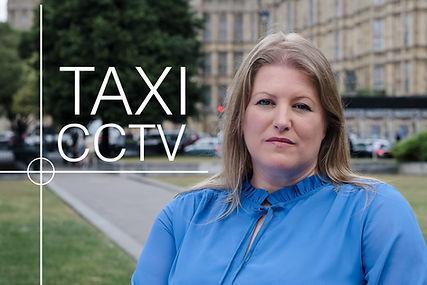
Police and Crime Commissioner Donna Jones has called for the introduction of mandatory CCTV cameras in Hackney carriages and private hire vehicles (PHVs) across Hampshire and the Isle of Wight. The initiative would aim to enhance the safety of passengers and drivers, following a recent conviction of a taxi driver involved in a serious sexual assault case.
Commissioner Jones submitted a deputation which was heard at the Gosport Regulatory Board meeting held on Wednesday 26 July. The meeting discussed proposed amendments to taxi licensing requirements, including the compulsory installation of CCTV cameras.
The need for this change stems from a May 2023 incident in Southampton, where a taxi driver was convicted of sexually assaulting a female passenger. Crucial evidence leading to the conviction was captured on the mandatory CCTV camera installed
in the vehicle. The footage, depicting the serious sexual assault, resulted in a guilty plea from the driver, sparing the victim from the additional trauma of a trial.
In June, Commissioner Donna Jones addressed a letter to the Secretary of State for Transport, Mark Harper MP, urging him to review the existing statutory licensing guidance for local authorities and consider implementing nationwide regulations mandating CCTV cameras in taxis and private hire vehicles.
The introduction of mandatory CCTV cameras in taxis and PHV may add another layer of security and act as a deterrent against criminal activities. Recording incidents in real-time, these cameras can serve as crucial evidence in investigations and ensure that justice is served swiftly and efficiently.
However, critics working in the taxi industry are concerned about the high costs involved to implement equipment, coming at a time of

30 | TAXIPOINT | AUGUST 2023 | EDITION 52 WWW.TAXI-POINT.CO.UK
UK NEWS
IMAGE CREDIT: HAMPSHIRE PCC
economic uncertainty and rising living costs. There are also worries around data compliance and privacy from both drivers and passengers.
Police and Crime Commissioner Donna Jones said:
“Both of the cities in Hampshire already require CCTV cameras in taxis. Portsmouth and Southampton licensing conditions require CCTV to be fitted before a taxi licence is issued. Today I am calling for all Councils in Hampshire and the Isle of Wight to follow suit with Gosport being the first to consider this issue.
“The victim in the Southampton case could not recall the attack, but thanks to the camera installed inside the cab, a dangerous sexual predator has been removed from our communities.
“I strongly believe there are lessons to be learnt from horrific local incidents like this, just as much as
the high profile cases we have witnessed over the last two years.
“
Cllr Lesley Meenaghan contacted me to ask about other areas and enquire about what more could be done to keep women safe.
“It’s clear where cameras are mandatory they are making people safer, and they are providing the police the evidence they need to convict those who are a danger on our streets. There is also the protection that cameras provide to drivers who on occasion are victims of crime too.”
Commissioner Jones added: “Whilst there are legitimate concerns about surveillance and data protection, I believe the safety of women outweigh risks to privacy, which is why I am asking for all local authorities to enforce these measures.”
FREENOW SUPPORTS REVIEW OF LOW TRAFFIC NEIGHBOURHOODS TO ENSURE ACCESSIBILITY FOR ALL
Following the announcement of Chancellor Rishi Sunak's order to review low traffic neighbourhoods (LTNs), FREENOW, a leading Super mobility App operating in nine markets across Europe, has expressed its support for the review.
While FREENOW does acknowledge the importance of implementing measures to reduce traffic and decrease emissions in cities, Mariusz Zabroki, UK General Manager at FREENOW, highlighted the unintended consequences that LTNs can have on vulnerable individuals who heavily rely on taxi services.
Zabroki emphasised the need for further discussion on the effectiveness of LTNs in achieving their intended goals.
FREENOW’s UK General Manager also expressed concern over the impact of LTNs on taxi and private hire vehicle (PHV) drivers, highlighting how these restrictions hinder their ability to provide highquality, door-to-door service to passengers. The limitations imposed by LTNs potentially ‘undermine’ the crucial role that taxi drivers play in

local transport networks and in ensuring accessible transportation for thousands of people.
Zabroki said: “At FREENOW, we support Prime Minister Rishi Sunak's order for a review of low traffic neighbourhoods (LTNs). While we understand and support the need to implement effective plans that will reduce traffic, tackle air pollution and reduce emissions in cities, it's clear that there needs to be some more discussion on what works best. LTNs cause issues for vulnerable people who rely on cabs, whether they have a disability, need to travel to hospitals or have young children and can’t access public transport. Policymakers locally and on a national level need to consider this when developing plans for traffic and emissions in local communities.
"These restrictions also affect taxi and PHV drivers’ ability to carry out their jobs to the highest standard and provide door-to-door service for their passengers. This has the potential to undermine the vital role they play in local transport networks and providing an accessible transport service for thousands of people.”
31 | TAXIPOINT | AUGUST 2023 | EDITION 52 WWW.TAXI-POINT.CO.UK
ENFORCEMENT NEWS

SEVEN MINICABS CAUGHT PLYING-FOR-HIRE DURING NOTTINGHAM JOINT OPERATION
CITY OF WOLVERHAMPTON COUNCIL CONDUCTS JOINT PHV LICENSING CHECK AT MANCHESTER AIRPORT
City of Wolverhampton Council conducted a joint licensing check operation at Manchester Airport at the end of July 2023.
In an effort to ensure public safety and maintain standards within the transport industry, the City of Wolverhampton Council Licensing and Trading department collaborated with Greater Manchester Police, Sefton Council, and Manchester City Council to conduct licensing checks on drivers and vehicles at Manchester Airport.
In a joint enforcement operation held on Friday 28 July, Nottingham City Council (NCC) Licensing and Nottinghamshire Police collaborated to crack down on illegal private hire vehicle (PHV) operations in Nottingham City Centre.
As a result, a whopping SEVEN PHV drivers were apprehended for illegally plying for hire. Illegal private hire vehicle operations can pose significant risks to both passengers and legitimate licensed taxi drivers. Such operations often occur when drivers accept passengers without having pre -booked the ride through an approved booking system. These unlicensed drivers not only put passengers at risk but also operate outside the law and invalidate insurance policies.
A Nottingham City Council Licensing spokesperson said via social media: “On Friday night, NCC Licensing and Nottinghamshire Police held a joint enforcement operation in Nottingham City Centre. 7 PHV drivers were caught illegally plying for hire and will be prosecuted.”

Compliance Officers from Wolverhampton Council joined forces with their counterparts from various local authorities on a joint operation to verify the compliance of licensed drivers and their vehicles on Tuesday, 25 July 2023.
A City of Wolverhampton Council Licensing and Trading spokesperson said: "Compliance Officers have been undertaking checks on Licensed Drivers and Vehicles with Greater Manchester Police at Manchester Airport today alongside our colleagues at Sefton Council and Manchester City Council.”

32 | TAXIPOINT | AUGUST 2023 | EDITION 52 WWW.TAXI-POINT.CO.UK
AIRPORT TOUTING: UTTLESFORD WATCH TFL IN ACTION AHEAD OF STANSTED TAXI AND PHV ENFORCEMENT CRACKDOWN
Uttlesford District Council (UDC) joined forces with Transport for London (TfL) and the Metropolitan Police to learn more about combating taxi touts operating at Stansted Airport.
A collaborative operation held at Heathrow Airport took place on 30 March, aiming to apprehend and deter individuals engaging in unlicensed taxi services. With the intention of implementing similar practices at Stansted Airport, UDC officers shadowed their counterparts and gained valuable insights into the process.

Five Licensing Officers actively participated in the operation. Following a detailed briefing on the plan of action and methods employed to identify suspected touts, the day's operation began at 9am. The operation proved to be highly productive, as the UDC officers gained a comprehensive understanding of the procedures involved.
Building on the success of their exposure to the Heathrow operation, UDC conducted its own independent operation in collaboration with the Stansted Airport Policing unit on the 6 April. While no formal actions were taken, the team successfully disrupted several touts, preventing them from carrying out unlicensed activities.
WEST YORKSHIRE POLICE CHECK 40 TAXIS PROMPTING 10 RECTIFICATION NOTICES FOR ISSUES FOUND

West Yorkshire Police’s Dewsbury Neighbourhood Policing Team conducted a multi -agency day of action with partners in the Ravensthorpe area on Friday 21 July in which dozens of vehicles and taxis were checked. Officers from the force's Roads Policing Team, Kirklees Taxi Licencing, DVLA and DVSA also took part in the operation.
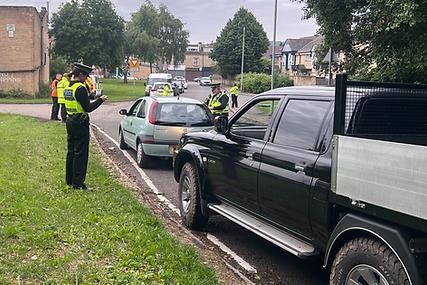
A total of 40 taxis were checked by Kirklees Taxi Licensing with 10 given rectification notices for offences such as failure to maintain lights, failure to have a fire extinguisher and needing new door signs.
Of the other vehicles stopped, one motorist had a car seized for being uninsured while two drivers were given Fixed Penalty Notices for driving anti socially and for having bald tyres.
33 | TAXIPOINT | AUGUST 2023 | EDITION 52 WWW.TAXI-POINT.CO.UK
IMAGE CREDIT: WEST YORKSHIRE POLICE
‘COCKNEY REG’ AND THE £8,000 TAXI FARE: YES THEORY TEAMS UP WITH LONDON CABBIE FOR EPIC ADVENTURE
The American YouTube video production team, Yes Theory, embarked on an extraordinary journey with an unlikely companion - an East London black cab driver named 'Cockney Reg'. With a budget of $10,000, the group aimed to push the boundaries of what was thought possible for a taxi ride.
Cockney Reg, a seasoned cab driver whose experience spans 48 years, was no stranger to the bustling streets of London. However, he had never been presented with an opportunity quite like this - to embark on a journey far beyond the UK borders.
The premise was simple: Yes Theory aimed to embark on the "longest possible cab ride", continuing until the meter reached an astonishing £8,000 (equivalent to approximately $10,000). With this ambitious goal in mind, they set off looking to hail a taxi driver willing to accept the challenge.
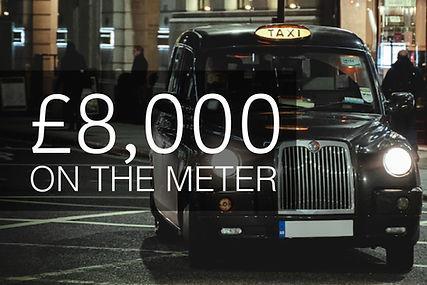

The Yes Theory team, renowned for their pursuit of unconventional experiences, boldly approached Reg with a proposition to see how far he could get his passengers for the planned metered trip. Without hesitation, he agreed to take on the unique fare.
As they traversed through countries and borders, the team documented their journey on camera,
capturing awe-inspiring landscapes, fascinating encounters with locals, and the sheer joy of venturing into the great unknown. From the bustling streets of London to the picturesque panoramas of continental Europe, the trip covered a staggering distance of 3,000 kilometres.
Reg, with his affable personality and wealth of knowledge, became more than just a driver - he became an integral part of the Yes Theory family. Together, they pushed past language barriers and navigated unfamiliar roads.
This extraordinary road trip, undertaken by Yes Theory and their trusty London black cab driver, reminded us all that life's greatest adventures often lie just beyond our comfort zones. And for these intrepid explorers, the journey truly became the destination.
34 | TAXIPOINT | AUGUST 2023 | EDITION 52 WWW.TAXI-POINT.CO.UK
LONDON NEWS
MAYOR OF LONDON DISMISSES CONCERNS THAT KNOWLEDGE PRESENTS ‘OBSTACLE’ TO BECOMING BLACK CAB DRIVER
The Mayor of London dismissed concerns that the Knowledge of London presented an ‘obstacle’ to those applying to become a black cab driver.
London Mayor, Sadiq Khan, responded to questions raised by Andrew Boff, a Conservative London Assembly Member, regarding the role of The Knowledge in the application process for a London taxi licence and the demographic challenges faced in the industry.
Sadiq Khan, Mayor of London, responded to the written questions: “London taxi drivers are worldrenowned for setting the gold standard for taxi services, due in large part to the Knowledge of
London. Taxi drivers have an unrivalled ability to recall of thousands of landmarks and streets within London.
“As set out in previous question, Transport for London has carried out a review of the Knowledge of London and has agreed with taxi trade representatives to progress a number of actions. Discussions with the trade continue about how to ensure the gold standard is retained while ensuring the Knowledge remains relevant in the modern world.”
Khan added: “I want taxi drivers to be as diverse as possible to reflect the magnificent diversity in London.
“
I am encouraged to see that the taxi trade is becoming increasingly more representative of London. The latest demographic statistics shows that 20 per cent of taxi drivers are from ethnic minority backgrounds and 62 per cent of those studying to become a taxi driver are from ethnic minority backgrounds.”
SECOND HAND: DEMAND FOR LOW MILEAGE LEVC TX TAXI CONTINUES TO BOOM ALONG WITH REMAINING DIESEL CABS

Taxi drivers are paying well for low mileage, wellmaintained one-owner LEVC TX taxis, continuing a surge in demand and rising prices.
According to a recent article in TAXI Newspaper, industry experts have observed a growing trend wherein these premium second-hand cabs are fetching prices around £40,000.
Despite the availability of later-model electric TXs going at lower prices, a steady group of drivers are willing to pay between £25,000 and £27,000 for the remaining Euro VI TX4 taxis. The decision to invest in these vehicles has baffled some industry experts. They argue that an additional £5,000 to £10,000 investment could provide drivers with the latest TX
model, boasting more advanced features, improved efficiency and more years on the road.
An industry expert in TAXI Newspaper wrote: “As more second-hand LEVC TXs come onto the market, the higher mileage ones are being traded at low £30,000s, but low mileage, immaculate one owner cabs are being snapped up, with drivers selling to other drivers at around the £40,000 mark.
“Late diesels are still doing. There is a small but steady group, who would rather pay £25,000, even up to £27,000 for a late Euro VI TX4. This still seems crazy to me, when another £5-£10,000 will put you in a TX, but I guess these drivers have their reasons.”
35 | TAXIPOINT | AUGUST 2023 | EDITION 52 WWW.TAXI-POINT.CO.UK
READING TARIFF REVIEW: NIGHT TIME FLAG FALL COULD RISE TO £6.90 IN READING
In an effort to address rising costs faced by licensed drivers, the taxi industry in the town of Reading has put forward fresh proposals for potential fare increases.
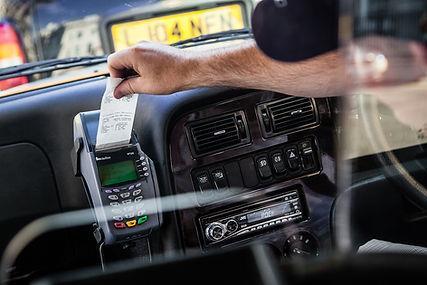

This comes as part of a regular review process called ‘cost indexing’ that considers factors such as inflation and fuel prices, alongside other pressures.
The proposed changes consist of an 8% increase for day fares and a 10% increase for night fares. Additionally, the 20p charge per yard would take effect every 123 yards, as opposed to the current 133 yards.
Of the suggested options, the preferred choice by the council, known as RTA's option 1, replaces the existing 50% surcharge for public holiday journeys with a new fare structure. This structure includes a day fare flag drop of £5.40, along with a 20p charge per yard, and a night fare flag drop of £6.90, along with a 30p charge per yard.
NEWCASTLE CITY COUNCIL DEFER PLANS TO REBRAND CITY’S TAXIS BLACK AND WHITE UNTIL FURTHER DISCUSSIONS
Newcastle City Council (NCC) have deferred plans to rebrand the city's hackney carriages in black and white after claims that the changes would cause "huge burden" for taxi drivers licensed with the authority.
The plans require licensed taxis to fit a white wrap around their bonnets, matching the colours of Newcastle United. City council leaders argue that the new colour scheme will make it easier to recognise licensed taxis and help crack down on crime.

However, more than 40 drivers staged a demonstration outside the local authority HQ ahead of a Newcastle City Council meeting in June, calling for the idea to be dropped.
A council spokesperson said: "Over the summer d like to continue that engagement with GMB and the trade to clarify the purpose of the policy. The item for discussion will be deferred until the next council meeting to allow these conversations to take place.”
36 | TAXIPOINT | AUGUST 2023 | EDITION 52 WWW.TAXI-POINT.CO.UK REGIONAL NEWS
IMAGE CREDIT: NEWCAS TLE CITY COUNCIL
TAXIS AND PHVS LICENSED BY OLDHAM COUNCIL SET TO CHANGE POSITIONING OF ID PLATES AND OPERATOR LOGOS

Over the coming months, taxi and private hire passengers in Oldham will see small changes to how the borough’s fleet of licensed vehicles look.
Following a decision by the council’s licensing committee – which has been supported by the trade – the positioning of identification plates and operator logos on the vehicles will change.
Oldham Council licensed vehicles will now only display a rear licence plate. This plate will provide the licence number, vehicle registration number, expiry date, number of passengers allowed and the vehicle make and model.
Licence plates will no longer be displayed on the front of vehicles. Instead plate numbers will be
displayed in the top left of the vehicle windscreen.
There will no longer be large door signs showing operator details. They will instead have a smaller yellow door sign on the rear passenger doors of the vehicle that states: ‘Private Hire Vehicle. Not insured unless pre-booked with the operator.’
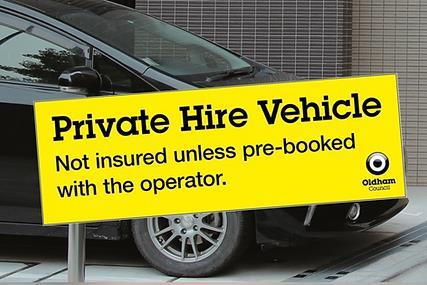
The logo of the operator they are working for will be on show in the passenger side of their windscreen.
This will enable residents who use landlines or shop phones when ordering a vehicle to be able to identify which one has arrived for them.
RULE CHANGE:
LEEDS TAXI AND PHV DRIVERS CAN NOW DRIVE FOR DUAL OPERATORS AND SCRAP WINDSCREEN LIVERY
Leeds taxi and private hire drivers will now be able to drive for two private hire operators, aligning Leeds with neighbouring authorities, as part of a new council pilot scheme.
The pilot follows concerns raised by Leeds taxi and private hire drivers that the current single operator model was creating an unjustifiable disparity in conditions with drivers licensed outside of Leeds, who are able to drive in Leeds for more than one operator.
Running for up to 24 months the pilot will allow the council to test out changes to policy relating to dual operators, including:
• Allowing Leeds licensed drivers to work for two operators.
• Removing the requirement to have windscreen livery.
• Considering options for displaying stickers for both operators on the sides of vehicles.
Following the pilot and appropriate consultation, a final decision will be made in relation to permanently amending the relevant driver, operator and vehicle conditions to allow taxi and private hire drivers licensed within Leeds to drive for dual operators.
37 | TAXIPOINT | AUGUST 2023 | EDITION 52 WWW.TAXI-POINT.CO.UK
DENBIGHSHIRE COUNTY COUNCIL BRINGS TO CLOSE ELECTRIC TAXI ‘TRY BEFORE YOU BUY SCHEME’

Denbighshire County Council’s pilot Green Taxi Project has completed its final low emissions mileage, supporting taxi firms across the county who are looking to cut their own carbon footprints.
The Council was one of the select few local authorities in Wales taking part in the Welsh Government funded scheme. Beginning during autumn 2021, the project initially included the use of four wheelchair-accessible Nissan Dynamo E-NV200 taxis to use as part of the ‘try before you buy scheme’.
The pilot project helped give 68 taxi drivers a taste of greener transport. Final mileage for the project saw the taxis cover roughly the distance of three and a half times around the world at 88,086 miles.

The number of trips taken to support how greener taxi transport can help cut emissions finished at 12,760 individual journeys, operating across Rhyl, Prestatyn, St Asaph, Denbigh, Ruthin, Corwen and Llangollen.

HYNDBURN COUNCIL TAXI AGE LIMIT REQUIREMENTS COULD BE EASED AS NEW REVIEW BEGINS
Hyndburn Council are looking to ease taxi and private hire vehicle (PHV) age limit requirements as part of its latest licensing review.
Currently, licensed vehicles over ten years of age must undergo testing three times a year and are issued a licence for a four-month period, except for hybrids. However, as an incentive to encourage owners to properly maintain older vehicles, a six-month licence is granted on the third consecutive occasion when the vehicle passes its test.
The proposed change under consideration would allow all vehicles between the ages of two and fifteen years to be granted a six-month licence, regardless of whether they are hybrid or not. Once a vehicle reaches fifteen years of age, it would revert to the current system of three tests per year and be issued a four-month licence.
The council is also considering removing the requirement for vehicles to carry a first aid kit and a fire extinguisher. A spokesperson for the council stated that these requirements may no longer be necessary due to certain factors, leading to a proposal for a consultation on the matter.
38 | TAXIPOINT | AUGUST 2023 | EDITION 52 WWW.TAXI-POINT.CO.UK
IMAGE CREDIT: DENBIGHSHIRE COUNTY COUNCIL
INSURANCE FINANCE









39 | TAXIPOINT | AUGUST 2023 | EDITION 52 WWW.TAXI-POINT.CO.UK
TAXI TYRES
EMISSIONS SYSTEMS APPS









40 | TAXIPOINT | AUGUST 2023 | EDITION 52 WWW.TAXI-POINT.CO.UK
MEMBERSHIP CARD PAYMENTS DISPATCH







 TaxiPoint Editor and Founder
TaxiPoint Editor and Founder





















































